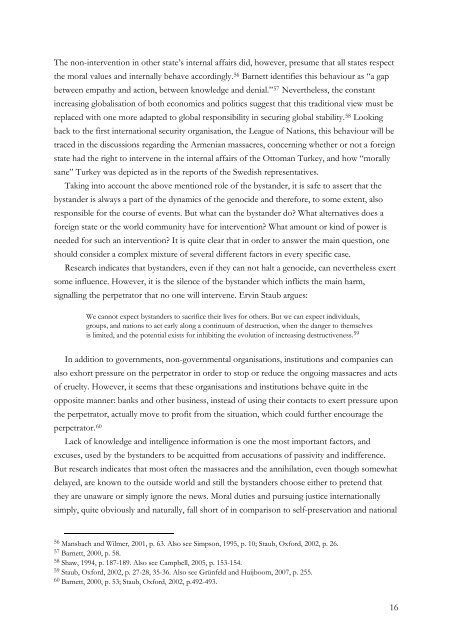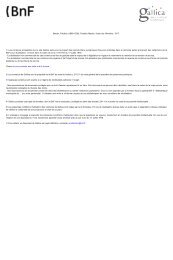The non-intervention in other state’s internal affairs did, however, presume that all states respectthe moral values and internally behave accordingly. 56 Barnett identifies this behaviour as “a gapbetween empathy and action, between knowledge and denial.” 57 Nevertheless, the constantincreasing globalisation of both econ<strong>om</strong>ics and politics suggest that this traditional view must bereplaced with one more adapted to global responsibility in securing global stability. 58 Lookingback to the first international security organisation, the League of Nations, this behaviour will betraced in the discussions regarding the Armenian massacres, concerning whether or not a foreignstate had the right to intervene in the internal affairs of the Ott<strong>om</strong>an Turkey, and how “morallysane” Turkey was depicted as in the reports of the Swedish representatives.Taking into account the above mentioned role of the bystander, it is safe to assert that thebystander is always a part of the dynamics of the genocide and therefore, to s<strong>om</strong>e extent, alsoresponsible for the course of events. But what can the bystander do? What alternatives does aforeign state or the world c<strong>om</strong>munity have for intervention? What amount or kind of power isneeded for such an intervention? It is quite clear that in order to answer the main question, oneshould consider a c<strong>om</strong>plex mixture of several different factors in every specific case.Research indicates that bystanders, even if they can not halt a genocide, can nevertheless exerts<strong>om</strong>e influence. However, it is the silence of the bystander which inflicts the main harm,signalling the perpetrator that no one will intervene. Ervin Staub argues:We cannot expect bystanders to sacrifice their lives for others. But we can expect individuals,groups, and nations to act early along a continuum of destruction, when the danger to themselvesis limited, and the potential exists for inhibiting the evolution of increasing destructiveness. 59In addition to governments, non-governmental organisations, institutions and c<strong>om</strong>panies canalso exhort pressure on the perpetrator in order to stop or reduce the ongoing massacres and actsof cruelty. However, it seems that these organisations and institutions behave quite in theopposite manner: banks and other business, instead of using their contacts to exert pressure uponthe perpetrator, actually move to profit fr<strong>om</strong> the situation, which could further encourage theperpetrator. 60Lack of knowledge and intelligence information is one the most important factors, andexcuses, used by the bystanders to be acquitted fr<strong>om</strong> accusations of passivity and indifference.But research indicates that most often the massacres and the annihilation, even though s<strong>om</strong>ewhatdelayed, are known to the outside world and still the bystanders choose either to pretend thatthey are unaware or simply ignore the news. Moral duties and pursuing justice internationallysimply, quite obviously and naturally, fall short of in c<strong>om</strong>parison to self-preservation and national56 Mansbach and Wilmer, 2001, p. 63. Also see Simpson, 1995, p. 10; Staub, Oxford, 2002, p. 26.57 Barnett, 2000, p. 58.58 Shaw, 1994, p. 187-189. Also see Campbell, 2005, p. 153-154.59 Staub, Oxford, 2002, p. 27-28, 35-36. Also see Grünfeld and Huijbo<strong>om</strong>, 2007, p. 255.60 Barnett, 2000, p. 53; Staub, Oxford, 2002, p.492-493.16
interests. Despite his famous “14 points”, championing the right to national self-deter<strong>min</strong>ation,the US President Wilson did not quite equate the priority of justice with that of order. He didneither push for these principles in general nor did he fulfil his initial idea of extending Americanprotection over the Armenians. Moreover, even if the President would have followed throughwith his principles, the American people would not have supported him in assu<strong>min</strong>gresponsibilities beyond their border. This was well displayed with a kind of “moral anaesthesia”which the Americans adopted during the 1920s and 1930s in regard to international affairs. Thisrhetoric repeated itself during the Second World War, when President Roosevelt, despite obviousknowledge about the Nazi mass killings of Jews, refused to believe the scale of the massacres. Inregard to Washington’s lack of knowledge about the Nazi plans back in 1942, Raphael Lemkinwrote: “I thought: genocide is so easy to dismiss because people do not believe it until after ithappens”. 61 John L. Gaddis, however, does not believe that it was lack of knowledge thatrestrained them fr<strong>om</strong> intervening, but rather unwillingness to engage in any operation which didnot have a direct impact on the war efforts. Reluctant to forward the received news in 1942 aboutthe annihilation of Jews, Elbridge Dubrow, Chief of the European Division of the US StateDepartment, crossed out the news with the instruction “Do not send, E.D.” In a memorandumhe explained the undesirability of the news due to the “fantastic nature of the allegation.” 62 Thisembodied the informed, but an indifferent world which hesitated to intervene. The internationalc<strong>om</strong>munity did not consider the massacres an issue of high priority c<strong>om</strong>pared to the ongoing war.And even though the above mentioned episode is fr<strong>om</strong> the WWII, as it will be shown later, it ishighly representative for the attitude displayed towards the Armenians during WWI.It is safe to contend that there were different kinds of indifference: those who did not care atall; those who felt sympathy in silence; and those who were indifferent due to military, political orecon<strong>om</strong>ic interests. The latter group choose indifference as a tactic to be kept outside theproblem while benefiting fr<strong>om</strong> the relationship with the perpetrator. 63 The task in this paper willpartly be to identify whether the role of bystander, i.e. an informed yet passive observer whorefrained fr<strong>om</strong> any actions in spite of the knowledge regarding the atrocities, applies to theSwedish society and the Swedish actors. Could the Swedish missionaries, dipl<strong>om</strong>ats and militaryrepresentatives be regarded as bystanders? Were the Swedish Society, Church, and Governmentbystanders to the event? And finally, can Sweden’s behaviour in regard to the Armenian questionbe regarded as one of a bystander? Using the role of the bystander at different levels is the basisfor understanding how a small neutral state such as Sweden could have acted in response to theArmenian massacres.61 Lemkin, 2002, p. 383. For the Rwanda case see Grünfeld and Huijbo<strong>om</strong>, 2007, p. 165.62 Gaddis, 2003, p. 158-159. Hilberg, 1992, p. 249, 253. Barnett too points the factor of isolationism as a reasonfor a society’s apathy in regard to world events. See Barnett, 2000, p. 50-51.63 Barnett. 2000, p. 122-123.17
- Page 3 and 4: 1 Introduction.....................
- Page 5 and 6: War, rather confirm the version of
- Page 7 and 8: 1.2 Previous ResearchWhen discussin
- Page 9 and 10: Military Attaché and the missionar
- Page 11 and 12: situation: “It is a crime when Te
- Page 13 and 14: in the following investigation, whi
- Page 15: killed. The slaughterer slaughtered
- Page 19 and 20: morality, balance of power, or the
- Page 21 and 22: 4. International organisations (e.g
- Page 23 and 24: warring parties. 104 This observati
- Page 25 and 26: Concerning the protocols of the Swe
- Page 27 and 28: present in Turkey. These documents
- Page 29 and 30: He also mentions meeting an Armenia
- Page 31 and 32: the annihilation. General von Losso
- Page 33 and 34: 1.5 BackgroundIn order to understan
- Page 35 and 36: 1914, when two inspector-generals f
- Page 37 and 38: to Islam or were sold as slaves to
- Page 39 and 40: 2 Empirical AnalysisThe empirical r
- Page 41 and 42: It does not seem to be the Turkish
- Page 43 and 44: The Turks claim that, at the Russia
- Page 45 and 46: The Armenian population has equippe
- Page 47 and 48: 1917 was the revival year for the A
- Page 49 and 50: Even if the communication between t
- Page 51 and 52: implemented against the Armenian na
- Page 53 and 54: Anckarsvärd continued claiming tha
- Page 55 and 56: Germany is blamed for its accessory
- Page 57 and 58: Here Wirsén took the liberty to co
- Page 59 and 60: On February 19, news of new Armenia
- Page 61 and 62: estricted to the fields of intrigue
- Page 63 and 64: generous offer of President Wilson
- Page 65 and 66: Lange gave a detailed description o
- Page 67 and 68:
skin was totally scorched. Another
- Page 69 and 70:
which her recurrently emphasised th
- Page 71 and 72:
The sooner calls referring to the A
- Page 73 and 74:
Despite these facts, Armenia was th
- Page 75 and 76:
Svenska Riksarkivet [Swedish Nation
- Page 77 and 78:
Bakhtiari, Kalla det vad fan du vil
- Page 79 and 80:
Chan, Steve and Drury, Cooper A., S
- Page 81 and 82:
Moranian, Suzanne Elizabeth, Bearin
















